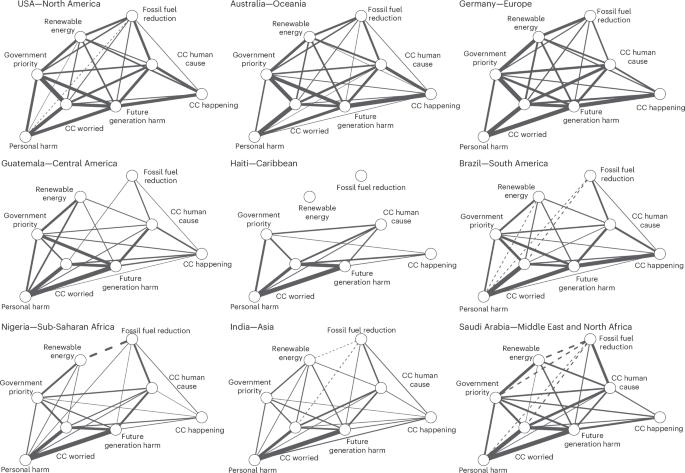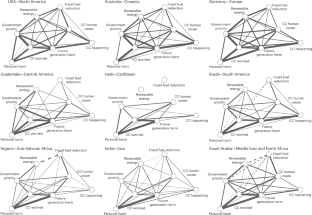气候变化信念系统在110个地理区域的差异
IF 27.1
1区 地球科学
Q1 ENVIRONMENTAL SCIENCES
引用次数: 0
摘要
气候信念影响着人们对气候行动的参与,但研究往往忽视了它们之间的相互联系。本研究将气候信念作为一个信念系统,并检查了两个结构特征:密度(所有联系的强度)和不一致性(信念之间的冲突)。利用Facebook对110个地理区域(n = 99,074)的调查数据,我们发现全球北部呈现出更高密度的网络,那里的气候信念更紧密相关,而许多全球南部地区则有积极的信念,但相互关联较少。在反对减少化石燃料使用与支持可再生能源和政府优先考虑气候政策发生冲突的地理区域(如中东),这种不一致现象也出现了。信息暴露与密度正相关,与不一致性负相关。人均国内生产总值与密度正相关,碳资源依赖与不一致性正相关。这些发现提供了沟通策略,以增强气候信念的耐力,同时解决可能破坏气候行动的相互冲突的信念。本文章由计算机程序翻译,如有差异,请以英文原文为准。


Variations in climate change belief systems across 110 geographic areas
Climate beliefs shape engagement with climate action, yet research often overlooks their interconnections. This research frames climate beliefs as a belief system and examines two structural features: density (the strength of all connections) and inconsistency (conflicts between beliefs). Using Facebook survey data from 110 geographic areas (n = 99,074), we show that global north presents higher density networks, where climate beliefs are more tightly correlated, while many global south areas have positive but less interconnected beliefs. Inconsistency appears in geographic areas where opposition to reducing fossil fuel use conflicts with support for renewable energy and government prioritization of climate policies, such as in the Middle East. Information exposure is positively correlated with density and negatively with inconsistency. Gross domestic product per capita is positively associated with density and carbon resource dependence positively correlates with inconsistency. These findings offer communication strategies to enhance climate belief endurance while addressing conflicting beliefs that may undermine climate action. Climate beliefs do not exist in isolation but form an interconnected network known as a belief system. This study analyses the density and inconsistency of belief systems and their associations with informational and socioeconomic factors to inform effective climate change communication strategies.
求助全文
通过发布文献求助,成功后即可免费获取论文全文。
去求助
来源期刊

Nature Climate Change
ENVIRONMENTAL SCIENCES-METEOROLOGY & ATMOSPHERIC SCIENCES
CiteScore
40.30
自引率
1.60%
发文量
267
审稿时长
4-8 weeks
期刊介绍:
Nature Climate Change is dedicated to addressing the scientific challenge of understanding Earth's changing climate and its societal implications. As a monthly journal, it publishes significant and cutting-edge research on the nature, causes, and impacts of global climate change, as well as its implications for the economy, policy, and the world at large.
The journal publishes original research spanning the natural and social sciences, synthesizing interdisciplinary research to provide a comprehensive understanding of climate change. It upholds the high standards set by all Nature-branded journals, ensuring top-tier original research through a fair and rigorous review process, broad readership access, high standards of copy editing and production, rapid publication, and independence from academic societies and other vested interests.
Nature Climate Change serves as a platform for discussion among experts, publishing opinion, analysis, and review articles. It also features Research Highlights to highlight important developments in the field and original reporting from renowned science journalists in the form of feature articles.
Topics covered in the journal include adaptation, atmospheric science, ecology, economics, energy, impacts and vulnerability, mitigation, oceanography, policy, sociology, and sustainability, among others.
 求助内容:
求助内容: 应助结果提醒方式:
应助结果提醒方式:


